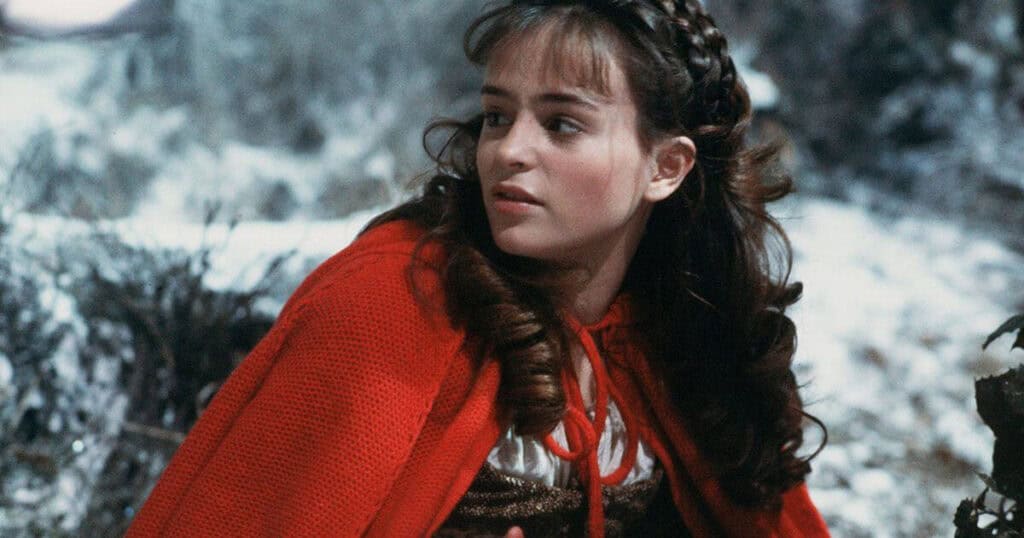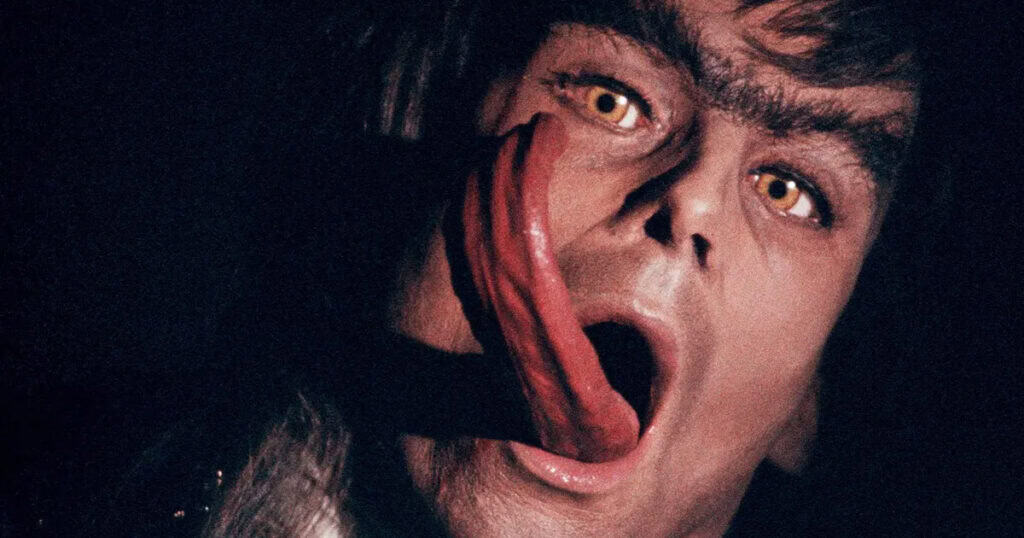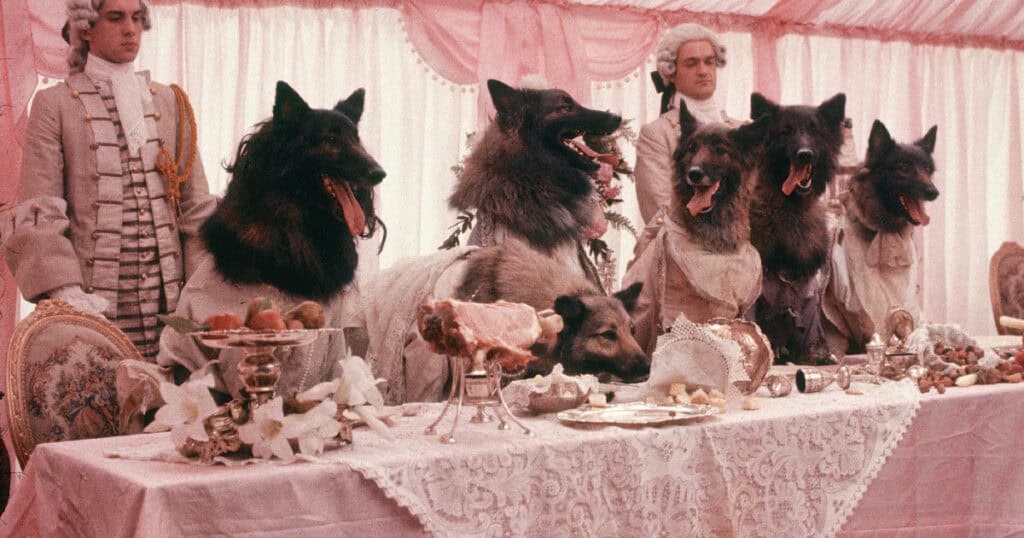
Fairy tales are the source of many of our favorite fantasy films and tropes. The classics like Snow White, Hansel & Gretel, and Sleeping Beauty have led to some fantastic feature films and many of them crossed into the horror genre, mixing the fantasy with a hefty dose of blood. The original stories that the fairy tales we grew up with came from were not the spic and span Disney fare we would read. They were dark, gritty stories that, more often than not, revolved around a horrible death or two.
They were morality tales guaranteed to make a child’s or an adult’s blood run a bit colder and scare them into listening. One of the most terrifying and cautionary of these tales was Little Red Riding Hood. Not only did the story include a young woman in danger, but it also involved a werewolf who eats her grandmother, a woodsman who cuts the wolf open, so all the guts and grandma come falling out, but also a moral of don’t stray from the straight and narrow path. While you may think that’s a heavy-handed way of teaching that moral…we’re still talking about the story. How many years later?
Little Red Riding Hood has since become a favourite of the fairy tales of our youth, and the story has been retold many times over in novels, cartoons, comics, and films. However, one retelling stands out for me and is not nearly talked about enough for what it delivered in retelling the story and some of the most beautiful visuals in fantasy horror. It also has one of the most astonishing wolf transformations ever on film. That, my friends, is The Company of Wolves, a movie that deserves more love and eyeballs.
On this episode of Fantasizing About Fantasy Films, we’re heading into the forest, straying from the path, and finding ourselves in The Company of Wolves.
The Company Of Wolves began as part of a short story collection by writer Angela Carter called The Bloody Chamber. The stories were all based on famous fairy tales, with a number of them based on Little Red Riding Hood or Beauty and The Beast.
Director Neil Jordan met with Carter, and the two collaborated on the film’s script, with Carter adapting her own stories. With the film heavily influenced by fairy tales, Neil Jordan (who we interviewed recently) was a perfect director for the project. He worked with the late Anton Furst on designing the look of the feature. Furst’s work on the film would lead to him working with Stanley Kubrick on Full Metal Jacket and Tim Burton, with who he would design the legendary Batmobile.

Casting for the film would be unique. Sarah Patterson, who wasn’t even 13 years old when she auditioned, would be cast as Rosaleen, the piece’s titular Little Red Riding Hood. David Warner would be cast as her father. Angela Lansbury was only 50 years old then and was cast as Granny. Stephen Rea would star as one of the stories within the story’s characters known as the Groom. Rea would go on to work with Jordan many times after this in Interview With The Vampire and The Crying Game. Micha Bergese would be cast as The Huntsman. Bergese wasn’t even up for a role in the film but was there to help choreograph scenes for Stephen Rea. Jordan saw him and decided the stunning man would be a perfect fit for the dashing and deadly character role.
The film would start production at Shepperton Studios in England in early 1984 and be released in the US in July of that same year. It would hit screens in the UK in September. Filming would be exciting as actual wolves would be on set and interacting with the teenage Patterson during shooting. As such, there was a rifle on hand and tranquillizer darts to ensure the safety of the cast and crew. Thankfully, none of these were needed, but oddly enough, the wolf that was to shoot the scene with the duck being used as bait was spooked by the duck…and wouldn’t return to the set.
The Company of Wolves is surreal and otherworldly, just like any fairy tale should be. The film begins in modern times when a family returns home where their youngest daughter is asleep in her room. She has dreams where she and her family, including her sister Alice, live in a village in the 18th century. There, Alice meets her end after being chased and attacked by a pack of wolves in the forest.
Rosaleen stays with her grandmother, a woman who doesn’t suffer fools and always has words of wisdom and warning for Rosaleen. Most of these are to warn her about the ways of men and never stray from the path in the forest. One of the most important is “Never trust a man whose eyebrows meet.” Something Rosaleen doesn’t listen to later on.
Rosaleen’s village is again the victim of a wolf attack, and this time, they catch and kill the wolf whose body turns into that of a person, much to the horror of everyone.
Rosaleen and a local boy who reminds me of that poor kid in So I Married An Axe Murderer with the giant head are flirty in the forest. A werewolf isn’t enough to deter hormones. They decide to play a merry chase, which Rosaleen easily avoids, leaving the path and running into a handsome and surprising huntsman. The huntsman eventually persuades Rosaleen to make a wager for a kiss if he should win and get to her grandmother’s before her using his compass. If Rosaleen, staying on the path, beats him, she gets to keep the compass. Of course, we know how this ends, and we soon discover The Huntsman is a creature, not entirely a wolf or a man. And he’s eaten Granny. After being asked to provide her part of the bargain in a kiss, Rosaleen winds up shooting the huntsman, triggering one of the most extraordinary werewolf transformations ever made. The movie poster proudly sports this scene, which is just fantastic.

Rosaleen eventually realizes her sad half-wolf/half-man doesn’t belong in either world, much like she feels. She tells him a story while the wolves outside her granny’s home howl, and when the townsfolk appear, searching for her, we discover that Rosaleen has become a wolf herself, just like the huntsman. She runs off with him, finding her place in the wildwood. In the last scene, the pack of wolves burst into the modern Rosaleen’s bedroom through the windows, awakening her from her slumber to screams.
Within The Company of Wolves are stories within the story. The story is what fairy tales are all about, and, much like the Brothers Grimms collection, they all have morality tales within those stories to caution and guide.
Granny tells Rosaleen about a husband and wife. The husband is a man with eyebrows that are too close together. He answers “the call of nature” on his wedding night and leaves his wife behind. Years later, she remarried and had children with her new husband when she returned. In yet another disturbing transformation, her first husband, who answered nature’s call, changes into a wolf and is quickly dispatched by her new husband.
Another tale Granny tells is that of another man who had a unibrow and was the bastard son of a priest (this seems to be a prerequisite for bad things to happen to you.) Who has decided to make a pact with the devil for a potion to make him have hair grow on his chest. The devil arrives in a Rolls Royce in the foggy forest, driven by a blonde Rosaleen. The devil is a slick businessman in a suit (played by Terrance Stamp in an uncredited role…and who took it when Neil Jordan said he’d buy him a suit for his trouble…which is the one he’s wearing.) Of course, the deal doesn’t go as planned for the boy.
Rosaleen gets two stories of her own within the film. The first she tells her mother is about a lower-class woman who gets pregnant by a nobleman. She arrives on his wedding day to a noblewoman to place a curse on the fat and greedy nobles in attendance. She turns them all into werewolves and keeps her power over them by making them howl at night for the pleasure of her and her baby.
The final story (other than the main one’s conclusion) is the tale Rosaleen tells the transformed huntsman about a wounded female wolf who comes up through the village well and changes to a scared young woman a priest finds. The priest takes care of the girl who was shot while in wolf form by a villager. After staying in the world above, the wolf girl decides she does not belong there and crawls back down the well to her home.
The Company of Wolves is one of my favourite werewolf movies. There is no other film that looks like it that I can think of. The closest comparison I can come up with is Cocteau’s Beauty and the Beast having a baby with a Hammer horror film. It fully embraces the fairy tale lineage that it comes from but adds excellent horror elements to the stories that have always been there but were watered down over the years. The film’s haunting and beautiful soundtrack adds to this, being a neat combination of 80s and an oddly synthesizer-type harpsichord in certain scenes. It was done by George Fenton, who scored Ghandi and would go on to score Dangerous Liaisons, High Spirits (alongside Jordan again), and numerous other films throughout his career.

The film doesn’t cater to the viewer either by explaining away the ending. The dream-world aspects of the film are on purpose. We’re seeing the dreams of a young woman trying to come to terms with puberty and adolescence, fighting at odds with the fact that she’s growing up.
Not to get too deep into the woods (too late), but Rosaleen’s incapacitation and sleeping at home is probably due to her getting her first period, the fact she’s no longer a child anymore, coming into a clear and bleeding focus. When the wolves burst into her bedroom, adulthood destroys her toys and all childish things.
The young man going to the crossroads learns that trying to grow up too quickly can lead to dire consequences. Trust the wrong man, like the wife with the nature-loving husband, or take advantage of the wrong woman like the nobleman did, and you can get quite a nasty surprise.
However, Rosaleen embraces her nature through her story within her dream. She’s adventurous, not like the other girls in the village. She can stand up to the huntsman but also understands him. She likes him when she meets him and decides to play his game. Ultimately, she breaks free from the village’s ideals and runs with the wolves.
The original screenplay had more adult situations for Rosaleen and the Huntsman, but since Sarah Patterson was so young, Jordan rewrote the scenes to tone them down. There is still that touch of danger there; the huntsman’s predatory nature is what it is. But it isn’t as overt as it could have been.
As I said, the transformation effects and the effects in general for The Company of Wolves are amazing. This was in no small part due to Christopher Tucker, who sadly passed away in 2022. Tucker did the special effects for the film and created the amazing prosthetics for The Elephant Man in 1980. A decade later, he’d return to the land of werewolves again, working on the She-Wolf of London TV series in 1990.
The transformations were different for each story, but as I said, the huntsman would stand out for me. The work was beautiful and horrifying; I’ve yet to see anything like the creatures that Tucker brought to life.
The Company of Wolves is available on Blu-Ray and streaming. It’s been added recently to Shudder’s service as well. If you’ve never seen it, you need to rectify that quickly. You may have forgotten its existence, and you should fix that. And if you are a fan like I am, you’ll find yourself every so often, perhaps on a night with a full moon, longing for The Company of Wolves.
The post The Company of Wolves: The Best Werewolf Movie Ever? appeared first on JoBlo.
Leave a Reply